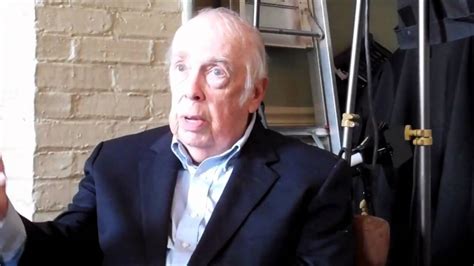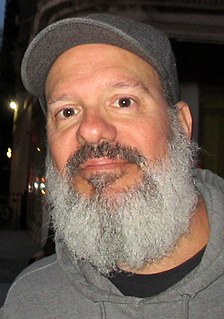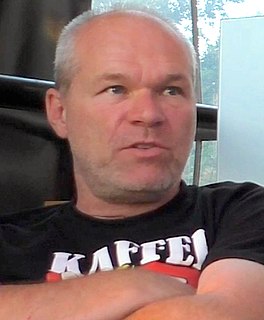A Quote by Joan Wallach Scott
Richard Hofstadter, in his famous book which was written in the time of the McCarthy period in the 1950 and 1960s, Anti-intellectualism in American Life, talks about the deep hatred that some Americans had for what they consider to be elitist intellectual activity. I think that's what's happening now.
Related Quotes
Sadly enough, there is a kind of an anti-intellectualism among many Christians: spirituality is falsely pitted against intellectual comprehension as though they stood in a dichotomy. Such anti-intellectualism cuts away at the very heart of the Christian message. Of course, there is a false intellectualism which does destroy the work of the Holy Spirit. But it does not arise when men wrestle honestly with honest questions and then see that the Bible has the answers. This does not oppose true spirituality.
George Bush ran a campaign where he bragged about being an anti-intellectual, dismissing his Harvard and Yale pedigree, pretending he was an American every day, ordinary everyman, and as a result of that, played up his fumbling speech because it signified that he was a good guy. That is deeply and profoundly anti-intellectual.
When the president talks about tax reform, he talks about the people who will benefit. He talks about American jobs. He talks about the fact that we're going to be taking money that's overseas and bringing it back to the United States so that it will employ American workers. I think that focus again on the American working and middle class is- is-is to me the most thoughtful and, in some ways, the most genius part of Trump's approach to politics.
The 1970s was probably the most exciting decade to be a teenager, from discovering Little Richard at the end of the 1960s to glam rock to punk rock to electro music. So much happened in that 10-year span. There were so many musical revolutions. Some were happening at the same time. You had disco going on behind punk. You had Michael Jackson. You had the Sex Pistols.
A triumph in which Kissinger could claim to have played some little part, in the presidential elections that November, President Richard Nixon had won the second greatest landslide in American history. Forty-seven million Americans had voted for him - and for his and Kissinger's policies - representing more than 60 percent of all the votes cast.
The Bible was written between 3,000 and 2,000 years ago, and it's filled with the knowledge that people had in that period of time, some of which you and I rejected long ago. The Bible says that women are property, that homosexuals ought to be put to death, that anybody who worships a false God ought to be executed, that a child that talks back to his parents ought to be stoned at the gates of the city. Those ideas are absurd.
Nothing detains the reader's attention more powerfully than deep involutions of distress, or sudden vicissitudes of fortune; and these might be abundantly afforded by memoirs of the sons of literature. They are entangled by contracts which they know not how to fulfill, and obliged to write on subjects which they do not understand. Every publication is a new period of time, from which some increase or declension of fame is to be reckoned. The gradations of a hero's life are from battle to battle, and of an author's from book to book.
The beginning as well as the end of all his thoughts was hatred of human law, that hatred which, if it be not checked in its growth by some providential event, becomes, in a certain time, hatred of society, then hatred of the human race, and then hatred of creation, and reveals itself by a vague and incessant desire to injure some living being, it matters not who.
Why ... do the myths of America the Hateful take such powerful hold? Because anti-Americanism provides a useful emotional function which goes beyond logic and reaches deep into the darker recesses of the European soul. In centuries past those on the Left who wished to personalise their hatred of capitalism, who sought to make it emotionally resonant by fastening an envious political passion on to a blameless scapegoat people, embraced anti-Semitism. It was the socialism of fools. Which is what anti-Americanism is now.
It's a lot of anti-gay, racist humor—which people like in America—all couched in 'I'm telling it like it is.' He's in the right place at the right time for that gee-shucks, proud-to-be-a-redneck, I'm-just-a-straight-shooter-multimillionaire-in-cutoff-flannel-selling-ring-tones act. That's where we are as a nation now. We're in a state of vague American values and anti-intellectual pride.
I had written a book called "Boston Boy" some years ago, and that took me from the time I could speak, I guess, in Boston through the time when I finally left to come to New York. One was understanding and coping with anti-Semitism. Boston, at the time, was the most anti-Semitic city in the country. And I found out when I was an adolescent that you have to be crazy to go out after dark all by yourself; you'd get your head bashed in.
I think it's better to be too early and disturb a few people - but have other people say it was necessary - than to do it way after the fact. We shouldn't forget that Charlie Chaplin did a movie about Hitler while Hitler was alive, and Peter Sellers in Stanley Kubrick's masterpiece Dr. Strangelove was during the McCarthy time, where everybody was a communist and McCarthy was flipping completely out. I think it's important to have a movie like Postal now, where we are on the peak of the Iraq War, on the peak of terrorist attacks, where everything is actually happening.








































